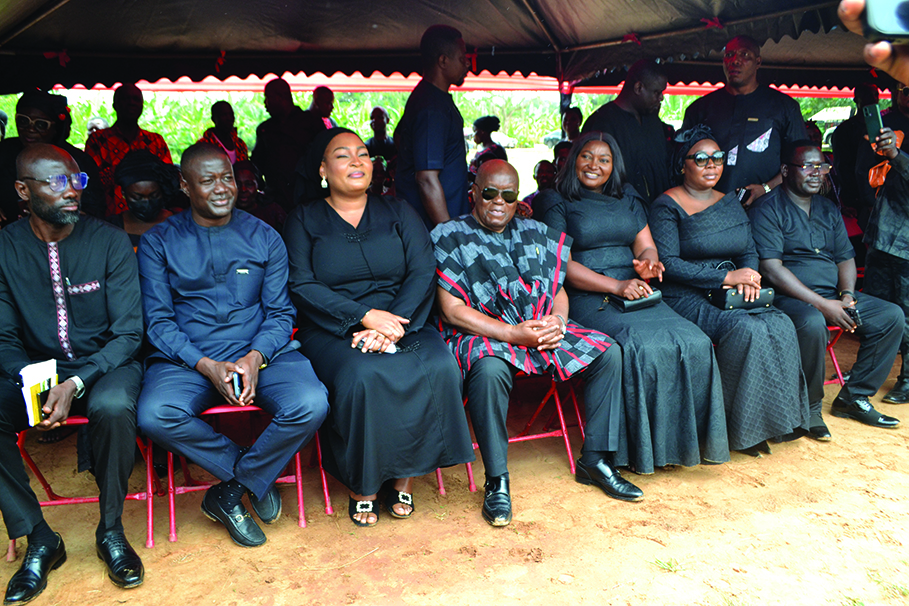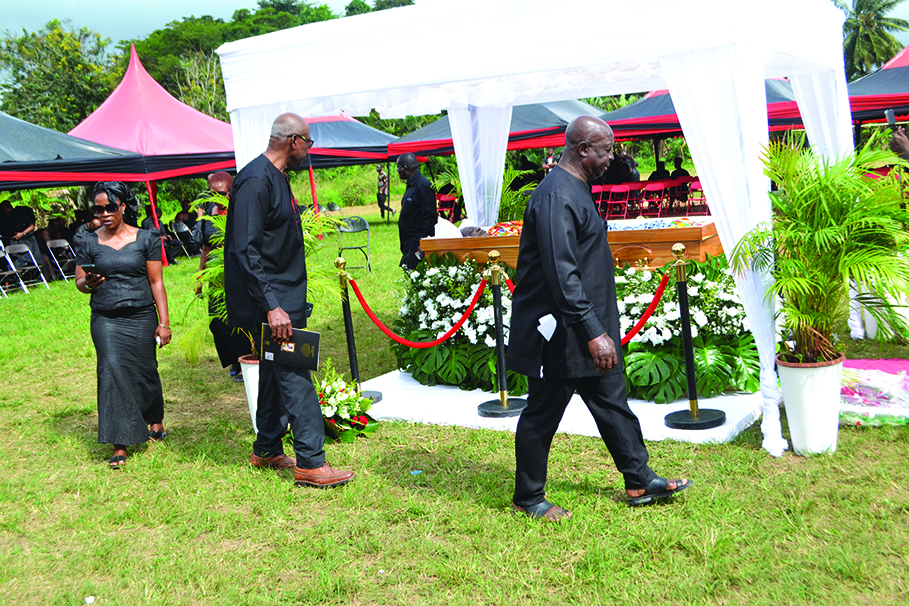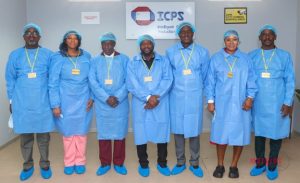
On Friday 29th August 2025, Dr. Ampong received two prestigious national awards: the Entrepreneurial Excellence Award at the National Business Honours 2025 held Accra, and the National Impact Leader in Agricultural Value Chain Transformation Award at the National Governance & Business Leadership Awards (NGBLA) .
Recently, he was appointed Fellow of The Chartered Institute of Leadership and Governance (CILG), named an Eminent Member and Subject Matter Expert on Innovations & Business Development with the Chartered Institute of Supply Chain Management – Ghana (CISCM), and inducted as a Member of the Institute of Directors – Ghana (IoD-Gh).
Additionally, WellMax Inclusive Insurance, part of the MIG Ecosystem, was named 1st Runner-Up at the United Nations Development Programme (UNDP) Inclusive Insurance Innovation Challenge 2025, recognised for redefining affordability, accessibility, and impact in the insurance space with a solution that offers hospitalisation and funeral cover for underserved communities.
At first glance, this editorial appears to be about awards and appointments. But look more closely, and it becomes a parable of how nations succeed or fail when they confuse spectacle for substance. This editorial is not a biography, nor is it a congratulatory note. It is an exploration of why these recognitions matter, not only to one man or one company, but to the way Ghana should think about leadership in the 21st century.
The illusion of the launch versus the discipline of the long haul
We live in an era that values beginnings like ribbon-cutting ceremonies, the minimum viable product, and impressive announcements. But what truly sustains economies is not the launch itself but the often overlooked work of maintenance, adaptation, and endurance. Ghana understands this lesson all too well.
From factories built in the 1960s that have been abandoned to decay, to digital initiatives that fail after their pilot phase, the pattern remains the same: we start but do not sustain. Even in the corporate world, many projects end up as press releases rather than long-term operations. The applause on opening day too frequently drowns out the quiet that comes afterwards when systems are not in place to keep the idea alive.
Dr. Ampong’s recognitions point us back to the harder truth that systems matter more than ceremonies. Agriculture does not transform because seeds are planted. It transforms when value chains (finance, logistics, processing, insurance, etc.) are stitched together into resilient wholes, supported by policies and institutions that last beyond one administration. Entrepreneurship thrives when institutions nurture businesses beyond the launchpad, ensuring that what begins as a promise matures into permanence. This requires patience, deliberate investment, and a cultural shift that values endurance as much as novelty.
Leadership as a system, not a personality
Ghana has too often equated leadership with personality. For a long time, the definition of a leader was reduced to the strongman, the visionary, the charismatic figure who commands attention. But leadership in the 21st century must go beyond charisma and personal magnetism. It must be systemic.
It must focus on unlocking capacity at every level, embedding resilience in organisations, and making institutions stronger than the individuals who temporarily hold them. This is why his induction into the Institute of Directors matters: it highlights a deliberate shift towards governance and stewardship rather than personality cults.
We should also reflect on the kinds of success we glorify. Why do we celebrate “Start-up of the Year” but rarely celebrate “Still Standing After 10 Years”? Why do we glorify disruption more than endurance? Why is short-term visibility so often placed above long-term credibility? Until we correct this cultural bias, we will continue to overvalue spectacle and undervalue resilience. In truth, resilience is the truest measure of leadership because only endurance proves whether ideas and systems can withstand the test of time.
Recognition as responsibility
What does it mean to be awarded in Ghana today? It should mean one thing: responsibility. Recognition must be a call to action with the expectation that the recipient will build systems that make food affordable, supply chains reliable, and governance credible. Awards are mile markers, not finish lines. They tell us where we have been, but they also remind us of the long road ahead. In truth, the applause of the moment is only justified if it translates into better lives for citizens tomorrow.
This man’s recognitions suggest a model of leadership worth imitating: entrepreneurship as system-building, governance as stewardship, and innovation as resilience. These are not abstract ideals but practical imperatives for Ghana’s survival in a volatile world. They call on award recipients not to bask in the ceremony but to shoulder the responsibility of embedding resilience into the very fabric of our national life.
Lessons from history: the cost of forgetting
Ghana’s history is filled with ambitious launches that faltered for lack of sustained systems. State-owned factories stood idle after leadership changed, leaving once promising industrial corridors silent. Rural electrification projects collapsed when spare parts ran out and maintenance budgets were neglected. Social initiatives evaporated when donor funds dried up and no domestic strategy existed to keep them alive.
Even flagship agricultural schemes have at times withered because continuity was sacrificed on the altar of politics. Each of these examples reveals a recurring pattern. It shows that we excel at launching, but stumble at sustaining. Recognition without responsibility produces monuments to failure rather than engines of progress.
This is why today’s leaders must study history not just as nostalgia but as instruction. The past teaches us that resilience is not optional. It is the only path to permanence, and without embedding this lesson into governance and business practice, Ghana risks repeating cycles of optimism followed by collapse.
Comparative insights: why some nations endure
Contrast Ghana’s experience with countries that have made endurance their priority. Singapore, with no natural resources, built systems of governance and logistics that made it a hub of global trade. Rwanda, scarred by conflict, has invested heavily in institutional resilience, positioning itself as a continental centre for innovation and governance. Even smaller economies in Europe have prospered not because of their size but because they built reputations of reliability. Their lesson is sobering: size and resources matter less than systems and discipline.
For Ghana, the message is clear. Our competitive advantage will not come solely from abundant cocoa or gold. It will derive from the invisible infrastructure of trust, reliability, and systemic resilience. It will stem from our capacity to ensure contracts are honoured, supply chains deliver as promised, and governance structures endure beyond individual leaders. These are the qualities that global partners value most, and they will ultimately determine Ghana’s position in the world economy.
Global Positioning: From local recognition to global relevance
Recognition at home is vital, but recognition abroad is transformative. Dr. Ampong’s wider record of awards in 2024–25 tells a larger story about Ghana’s place in the world.
At home, his leadership has been consolidated through strong governance and building with a young team, earning national recognition that demonstrates how systemic thinking delivers real impact.
Across Africa, his work has been celebrated with the Excellence in Sustainable Development and Impact Investing Award at the Africa SME Awards, reinforcing the idea that Ghanaian enterprises are not only national players but continental voices in shaping responsible investment and inclusive growth. He was also honoured as Promising Leader of the Year in Agriculture & Agro Products at the Asian African Leadership Awards 2024 in New Delhi, reflecting how Ghana’s innovation is being recognised on international platforms.
Globally, his recognition as the Global Most Impactful Entrepreneur at the Golden AIM Awards in Dubai, along with honours such as Best ESG-Focused Investment and Sustainability Services Provider and the Wealth & Sustainable Finance Excellence Award at the Worldwide Finance Awards 2025, positions Ghana among institutions meeting international standards of sustainability and resilience. Being named among the 100 Most Influential People by The Business Executive Group emphasises this reach.
Furthermore, recognition by the Africa–Asia Chamber of Commerce, which highlighted Dr. Ampong’s contribution to bridging entrepreneurial practice and sustainable investment between the two continents, reinforces that Ghanaian leadership is not only regional but part of a much broader dialogue. Some time ago, he was nominated in the Banking and Finance category for the upcoming Forty Under 40 Awards 2025, taking place this Friday the 5th of September at the Labadi Beach Hotel in Accra, further demonstrating that systems built with discipline and vision at home, even when you are under 40 years, can command credibility. He is a confirmed award recipient.
These recognitions, taken together, demonstrate that Ghana’s entrepreneurs and institutions are no longer competing solely at the local level. Under the AfCFTA, they are engaging directly with peers in Nairobi, Cairo, Johannesburg, and beyond. On the global stage, investors and partners are watching keenly, not for ceremonies, but for effective systems.
Sustainable systems with strong governance frameworks, dependable supply chains, and inclusive financial mechanisms are no longer optional. They are the essential requirement for relevance. If Ghanaian businesses are to succeed in continental and global markets, their credibility will be measured not just by their ability to launch, but by their capacity to endure.
Building Forward: What Ghana must do
The forward path requires a deliberate cultural shift. Policymakers must learn to value maintenance budgets as much as new projects. Businesses must reward longevity alongside innovation. Institutions must document lessons and embed institutional memory so progress is not lost with each leadership change. Citizens must demand endurance, not just novelty, from those who lead them.
Dr. Ampong’s recognitions offer a timely blueprint for us to connect systems, embed resilience, and treat leadership as stewardship. These principles must shape the way Ghana governs, trades, and innovates in the decades ahead.
The invisible work of maintenance, trust-building, and resilience rarely makes headlines, yet it is the true work of leadership. As we applaud recognitions, let us also confront the questions they raise:
- What systems are we building that will outlast us?
- How do we reward endurance, not just novelty?
- Can Ghana learn to celebrate resilience as much as it celebrates launches?
Dr. Maxwell Ampong’s recent set of recognitions is a reminder that leadership is more than applause. It is about the quiet, difficult, often invisible labour of system-building. He started more than a decade ago, quietly, building systems. And in the end, it is that invisible labour, not the ceremonies, that determines whether nations fall or rise.
The post Two awards, one lesson: Dr. Maxwell Ampong and the urgency of systemic leadership appeared first on The Business & Financial Times.
Read Full Story












Facebook
Twitter
Pinterest
Instagram
Google+
YouTube
LinkedIn
RSS